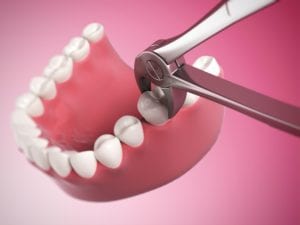TOOTH EXTRACTIONS NEAR YOU
Tooth extractions are procedures that dentists perform to maintain your oral health by removing teeth that are severely decayed, damaged, or otherwise problematic. In some cases, tooth extractions may also be necessary to prepare your mouth for cosmetic dental treatment. There are two different types of tooth extractions your dentist may perform depending on the condition of the tooth in need of extraction: simple and surgical. Simple extractions are used to remove teeth that are fully intact and erupted out of the gums, while surgical extractions are used to remove teeth that are partially or completely impacted below the gums.Did You Know?
Tooth extractions are a dental surgery that can be performed by your dentist in their office. In some complicated cases, however, they may choose to recommend an oral surgeon instead.
Frequently Asked Questions:
Do I need an extraction?
You may need a tooth extraction if you have one or more teeth that are severely decayed or damaged. You may also need a tooth extraction if you have wisdom teeth that are partially or fully impacted underneath the gum tissue. However, only a dental exam with x-rays can determine the need for a tooth extraction, so you will need to schedule an appointment with your Kamloops dental office.
What can I expect during my extraction procedure?
During your tooth extraction procedure, the affected area will be anesthetized to keep it numb. Additionally, dental sedation will also be used to keep you relaxed during the procedure. There are varying levels of sedation ranging from moderate to deep. Before your extraction appointment, these options will be discussed in depth to determine what level of sedation will be used. Once you have been sedated, the extraction procedure will be performed using one of the aforementioned extraction techniques. If a simple extraction technique is used, then the affected tooth will be elevated from the socket with a special tool and removed as one piece using forceps. If a surgical extraction technique is used, then a small incision will be made in the gums to access the impacted tooth. The affected tooth will then be broken down into sections and each section will be individually removed in order to minimize trauma. This allows an impacted tooth to be removed in a way that preserves the surrounding structures and expedites healing.What can I expect when recovering from the extraction procedure?



